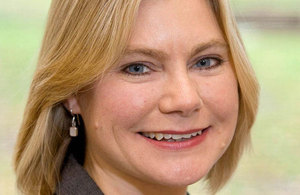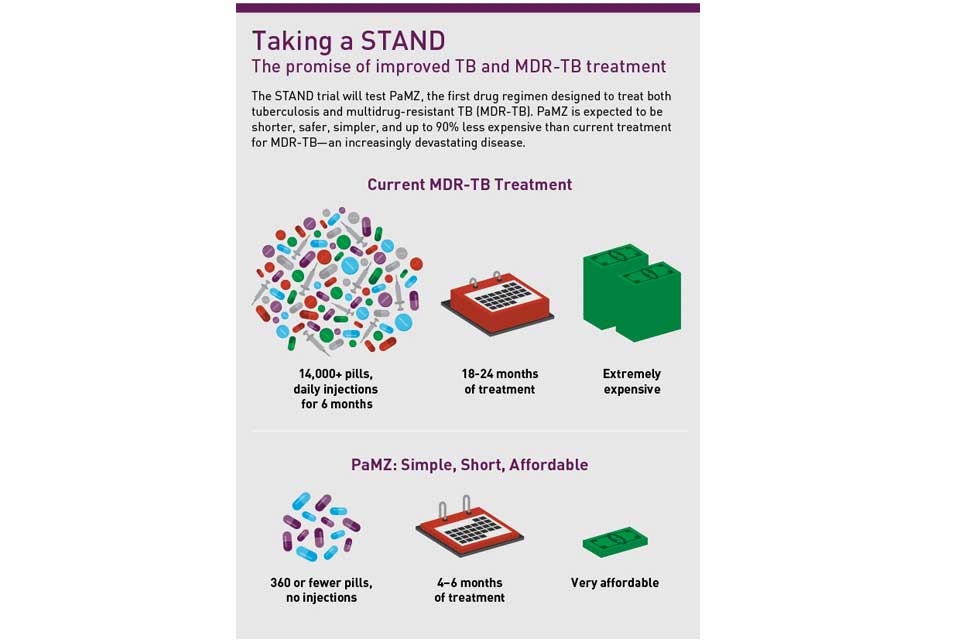Greening: Drug resistant TB threatens to reverse decades of progress
Britain to remain at the forefront of the fight against TB by funding the development of a simpler, safer and more affordable treatment.

Secretary of State for International Development, Justine Greening MP
Britain is funding a global clinical trial of new treatments to beat drug-resistant strains of tuberculosis that threaten to reverse decades of progress in fighting the disease, International Development Secretary Justine Greening said today.
Justine Greening said:
We have made tremendous progress in the fight against tuberculosis. The global campaign to tackle this deadly disease has led to a 45% fall in the death rate since 1990, saving millions of lives.
But drug resistance threatens to reverse decades of progress and new treatments must be developed to fight these strains. That is why Britain will remain at the forefront of the global fight against TB.
We are developing a new shorter, simpler, safer and more affordable treatment with the TB Alliance, helping treble access to rapid testing and reduce drug prices with UNITAID, and treating more than a million people with TB through the Global Fund.
A global campaign to tackle TB drawing in governments, agencies and funds such as the Global Fund has led to a dramatic drop in cases since 1990. Over the past 25 years the TB mortality rate has fallen by 45%.
However the incidence of Multi Drug-Resistance TB (MDR-TB) is now rising and there are few affordable or effective treatments to stop it. There were an estimated 480,000 new cases of MDR-TB in 2013 around the world.
A report released today by the All Party Parliamentary Group on Global TB suggests that, if no action is taken, by 2050 75 million people will lose their lives to MDR-TB and the infection could cost the global economy $16.7 trillion.
MDR-TB must be treated with a complex regimen of around 14,000 pills over the course of 2 years, or even longer, as well as injections for the first six months. The treatment can cause severe side effects and cost thousands of pounds.
This complexity and cost means only 20% of those diagnosed with MDR-TB actually receive treatment. Of those who do only half are cured.

Infographic: The potential impact of the new MDR-TB treatment
Britain’s Department for International Development (DFID) is funding a global clinical trial, led by the TB Alliance, for a new drug regime that could be key to beating Multi Drug-Resistant TB (MDR-TB).
Mel Spigelman, MD, President and CEO of the TB Alliance, said:
The incidence of Multi Drug-Resistant TB is rising and there is little in the way of affordable and effective treatments to stop it.
A global clinical trial has begun to test a new regimen for tuberculosis, which shows particular promise for improving treatment of multi drug-resistant TB. It could reduce the time to treat MDR-TB from 2 years or more to 6 months, remove 97% of the pills needed, and cost just a tenth of today’s treatment.
DFID has been at the forefront of the fight against TB and has been visionary in prioritizing investment for the development of new treatments, many of which are now in or about to start late-stage testing. It is these treatments that could scale global efforts to fight drug-resistant TB and prevent it from spinning further out of control.
Every year an estimated 3 million people were not diagnosed, not treated, or diagnosed but not registered by national TB programmes (NTPs) as having TB. DFID is working with the Stop TB Partnership to reach, treat and cure these 3 million.
Notes to editors
- Photos can be downloaded from here and here. Please credit to TB Alliance if used. The results of the latest trial, published in the Lancet, can be found here.
- In 2013, there were an estimated:
- 11 million people living with TB;
- 1.5 million deaths due to TB of which 510,000 were women;
- 9 million new TB cases of which 1.1 were also HIV-positive.
- Incidence rates fell at an average of 1.6% between 2000-13.
- All figures provided by the WHO or TB Alliance. For more figures, visit the WHO’s Global Health Observatory: http://www.who.int/gho/tb/en/
General media queries (24 hours)
Email mediateam@dfid.gov.uk
Telephone 020 7023 0600
If you have an urgent media query, please email the DFID Media Team on mediateam@dfid.gov.uk in the first instance and we will respond as soon as possible.